Introducing the Forward 125: The American Jews who shaped our world
Here are the people who’ve made headlines and history each year since the Forward was born
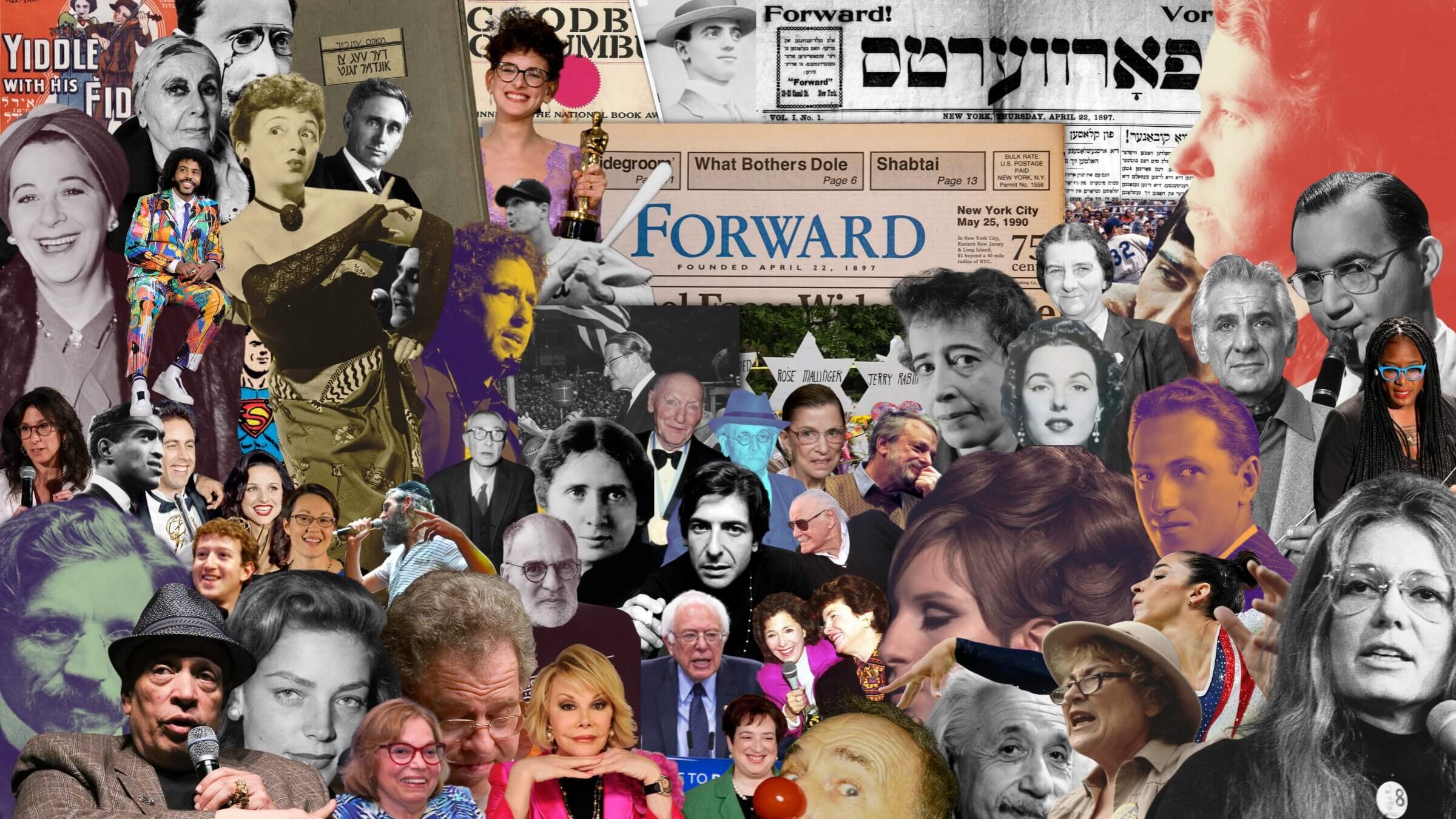
Our list of the 125 most influential American Jews, from 1897-2022. Graphic by Matthew Litman via Getty Images/Forward archives/Library of Congress/Wikimedia/IMDB/Kali Films/iStock/Universal Pictures/Random House/YIVO/the Center for Jewish History
Some are household names: pop-culture icons and Nobel Prize winners, Supreme Court justices and superhero athletes. Others were obscure individuals caught up in events that shaped society: the Triangle Shirtwaist fire and the Tree of Life massacre, firefighters who perished on 9/11, writers and producers blacklisted by Hollywood.
Their stories, and their impact, endure. The founders of Black Lives Matter and ACT UP. The creator of the first Yiddish cookbook in the U.S. and the inventor of modern jeans. Poets and publishers, actors and activists, rabbis and rabble-rousers, purveyors of kosher hot dogs and frozen bagels, Fanny Brice and the woman who played her on the big screen.
In celebration of the Forward’s quasquicentennial year — that’s fancy talk for 125th anniversary — we decided to take a walk back through history. Instead of compiling our annual Forward 50 list of influential American Jews, we created the Forward 125, with one entry for each year of our existence. Starting, of course, with the man who made our lists possible: Ab Cahan, the visionary founding editor who launched the Forward in 1897 with a 50-person collective, declaring: “Let’s publish a good, popular newspaper, content-rich and interesting.”
Putting together the list was a group project, with nearly every journalist on our staff, as well as our archivist, Chana Pollack, nominating candidates and unearthing fun facts about them. Special thanks to Matthew Litman, too, for creating the amazing photo collages sprinkled throughout this article, and Samuel Breslow, for fact-checking and copy-editing the project.
Who’s who? Scroll to the bottom of the list or click here to see a version of the collage with a numerical key.
Any such list, inevitably, leaves out a lot of fascinating and influential characters. We aimed to represent a wide range of endeavors: movies and music, religion and politics, philanthropy and finance, science and tech, and comedy — lots of comedy. We also tried to highlight women overlooked by history, people of color whose Jewish heritage may not be widely known, and warriors for justice whose legacies were far-reaching even if their names are forgotten.
Many were born here; others are immigrants. And our list includes a few — like Golda Meir, Israel’s only female prime minister, and the Montreal-born bard Leonard Cohen — who may not have considered themselves American but who spent formative years here.
Some of our Forward 125, like RBG and Einstein, are so famous they need no introduction. In other cases, we hope you’ll enjoy learning — as we did, in compiling the list — about these American Jews who shaped our history, and ourselves.
Let us know what you think of our list, or send the name and a brief description of someone you would have liked to see on it, to [email protected], subject line: Forward 125. We may publish a selection.
1897-1912
1897 Ab Cahan, a Lithuanian immigrant, launched the Forward, a Yiddish, socialist broadsheet that taught generations of Jewish immigrants how to be American. “I was driven by curiosity,” Cahan later wrote in his memoir. “In terms of experience, life for the immigrant becomes much richer in this country than in the old one.” He died in 1951, at age 91.
1898 Publisher Joseph Pulitzer’s sensational newspaper headlines and stories fueled outrage over the sinking of the USS Maine in Havana and galvanized support for the Spanish-American War. But Pulitzer’s legacy is not defined by yellow journalism: His bequests established the Pulitzer Prizes in journalism, literature and music, as well as Columbia University’s journalism school.
1899 Louise Nevelson, a sculptor who became one of the 20th century’s most renowned women artists, was born in a shtetl near Kyiv. She moved to Rockland, Maine, with her family in 1905.
1900 Herman Grossman became the first president of the new International Ladies’ Garment Workers’ Union, which established close ties with the Forward.
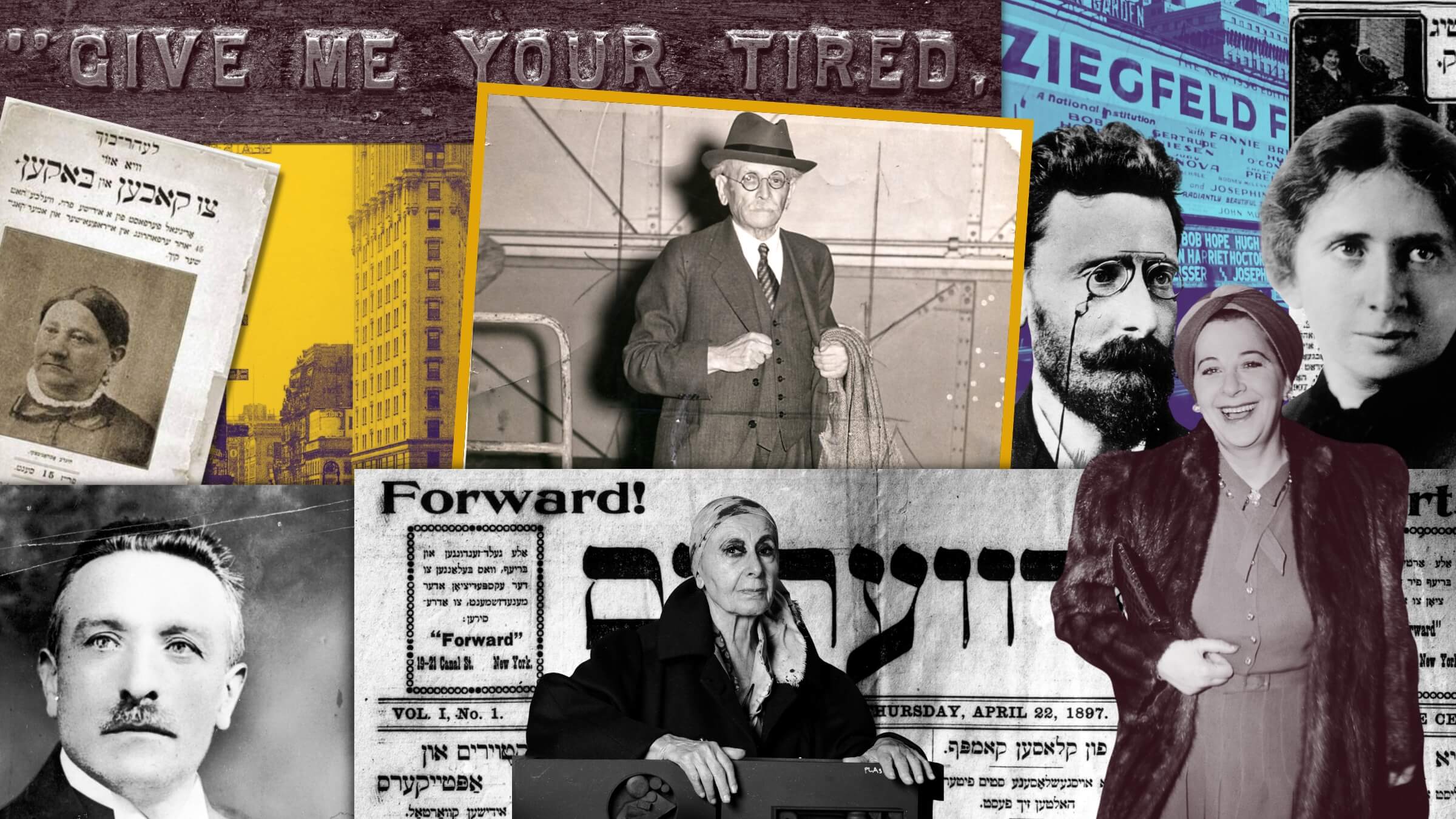
1901 Hinde Amchanitzky, a widow and retired owner of a popular restaurant on the Lower East Side of Manhattan, published the first Yiddish cookbook in America, Lehr-bukh vi azoy tsu kokhen un baken (A Manual on How to Cook and Bake). The book was sold from pushcarts and bookstores.
1902 Sarah Edelson, leader of a boycott by thousands of Jewish women against price-gouging kosher butchers, was arrested amid the so-called kosher meat riots on Orchard Street on the Lower East Side.
1903 Emma Lazarus’ celebrated poem, “The New Colossus,” was mounted on a plaque at the Statue of Liberty. Lazarus, who was Sephardic, was from one of New York’s (and North America’s) oldest Jewish families. Her line, “Give me your tired, your poor, your huddled masses,” is among the most-quoted lines of American poetry ever written, often used as a plea for social justice.
1904 The intersection of 42nd Street and Broadway was renamed Times Square in honor of a tower being built there to house The New York Times, owned by Adolph Ochs. During Ochs’ 39-year tenure as publisher, The Times evolved from a small paper with a circulation of 9,000 into one of the world’s most authoritative news sources. Ochs’ son-in-law, Arthur Hays Sulzberger, replaced him in 1935, cementing family control of the paper. The current publisher, Arthur Gregg Sulzberger, known as A.G., is Adolph Ochs’ great-great-grandson.
1905 Theodore Krainin opened the Hebrew National Kosher Sausage Factory on the Lower East Side. The company marketed hot dogs and other products with one of the best-known slogans in modern advertising: “We answer to a higher authority.”
1906 President Theodore Roosevelt appointed Oscar Straus as secretary of commerce and labor, the first Jewish member of any U.S. Cabinet.
1907 A teenage Pauline Newman led a rent strike of 10,000 families on the Lower East Side. She went on to become an important union organizer and activist.
1908 Jacob William Davis, a Latvian tailor who is credited with inventing modern jeans and who worked with Levi Strauss to patent and mass-produce them, died.
1909 Clara Lemlich sparked “The Uprising of the 20,000” — the largest strike by women in U.S. history — with a speech in Yiddish to thousands of female garment factory workers at Cooper Union’s Great Hall in Manhattan. The work stoppage lasted nearly three months and won the women shorter hours, better pay, equal workplace treatment and job security.
1910 Fanny Brice, whose life was later depicted in the 1964 Broadway musical Funny Girl, debuted at the Ziegfeld Follies. “I lived the way I wanted to live and never did what people said I should do,” Brice wrote in an unfinished autobiography.
1911 A week after 146 workers — mostly young Jewish women — died in the Triangle Shirtwaist fire, Rose Schneiderman delivered a fiery speech about the failure to protect “my sister workers.” Schneiderman went on to become the first woman elected to a national leadership position in a labor union and was appointed to the National Labor Advisory Board by President Franklin D. Roosevelt.
1912 Baltimore-born Henrietta Szold launched Hadassah, a women’s group that grew into one of America’s largest and most powerful Zionist organizations while laying the foundations for Israel’s medical and social service infrastructure.
1913-1927
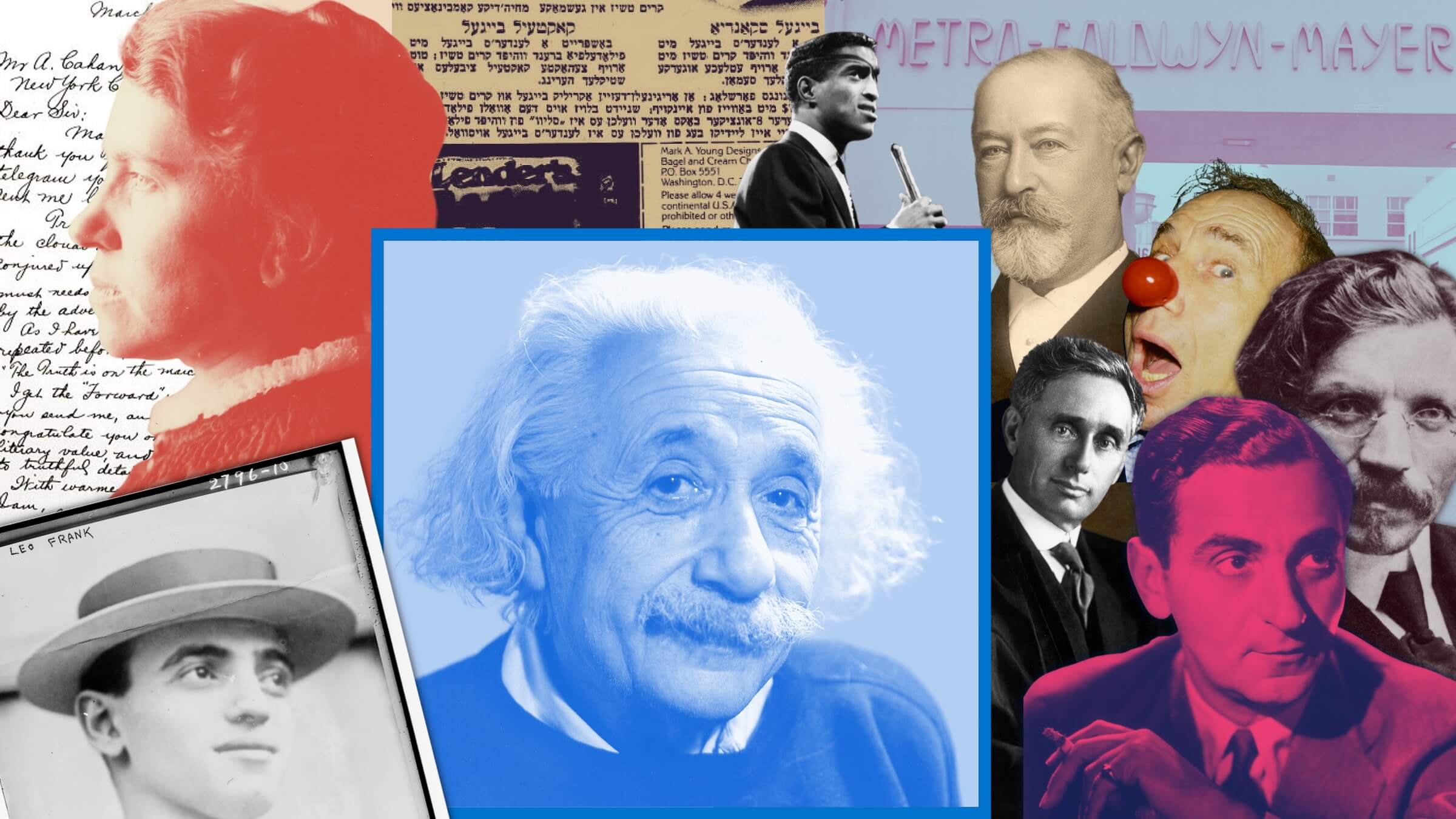
1913 Sigmund Livingston founded the Anti-Defamation League to fight antisemitic stereotypes and promote tolerance, and served as its first president.
1914 As World War I broke out, Sholem Aleichem fled Berlin and returned to New York City with his family. He died in the Bronx two years later and was buried in Queens. He is perhaps the best-known Yiddish writer of all time, but spent years struggling to make a living while touring abroad in poor health. Fiddler on the Roof is based on his stories about “Tevye the Dairyman.”
1915 Leo Frank was lynched by a mob after the governor of Georgia commuted his death sentence to life in prison. Experts today believe Frank was wrongly convicted, in an era of rampant antisemitism, of murdering a 13-year-old girl. He was posthumously pardoned in 1986.
1916 Louis Brandeis became the first Jewish justice on the United States Supreme Court. His appointment was delayed by months and triggered the first confirmation hearings ever held for a Supreme Court justice. Of the 116 justices who have served on the high court, eight have been Jewish.
1917 Irving Berlin made headlines for being drafted at age 30 to write morale-boosting songs for military revues (including “God Bless America”). Many Berlin songs remained popular for decades, including “Puttin’ on the Ritz,” “Cheek to Cheek,” “Anything You Can Do (I Can Do Better),” “There’s No Business Like Show Business,” and two celebrating Christian holidays: “White Christmas” and “Easter Parade.”
1918 Dancer and choreographer Jerome Robbins was born in Manhattan. His work earned five Tony Awards for shows including West Side Story and Fiddler on the Roof, and two Oscars, including a shared best director award for the film version of West Side Story.
1919 Anarchist Emma Goldman was deported to the Soviet Union. Her three decades of activism in the U.S. included arrests for distributing birth control, inciting a riot and opposing the draft.
1920 Jacob Schiff, a banker and philanthropist who supported many Jewish immigrant causes, died. The years 1880 to 1920 are known as “the Schiff era” for his financing of railroads, industry and other pillars of American expansionism.
1921 Albert Einstein won the Nobel Prize in physics — not for his most famous achievement, the theory of relativity, but for the photoelectric effect. Einstein fled his native Germany in 1933, and was one of the first Jews to teach at an Ivy League university, Princeton, where he lived until his death in 1955. He became a U.S. citizen in 1940.
1922 Judith Kaplan, daughter of Reconstructionist Judaism founder Rabbi Mordecai Kaplan, became the first girl to have a bat mitzvah in the United States.
1923 Benjamin Frankel started the world’s first Hillel at the University of Illinois Urbana-Champaign after graduating from Hebrew Union College and being ordained as a rabbi.
1924 Marcus Loew, who owned Metro Pictures, bought companies owned by Samuel Goldwyn and Louis B. Mayer to create the behemoth Hollywood production company Metro-Goldwyn-Mayer Studios (MGM). The Loews Theatre chain bore his name until 2017, when it was renamed AMC.
1925 Singer, dancer and actor Sammy Davis Jr. was born. He converted to Judaism after losing his eye in a car crash and often described himself as a “one-eyed Black Jew.”
1926 Mel Brooks was born. His movies — including Blazing Saddles, Young Frankenstein and The Producers, an unlikely farce about the staging of a Nazi-themed musical — are widely considered among the funniest films of the 20th century.
1927 Harry Lender opened Lender’s Bagels in New Haven, Connecticut. Lender’s became one of the largest bagel-makers in the world after his sons started shipping frozen bagels all over the country.
1928-1944
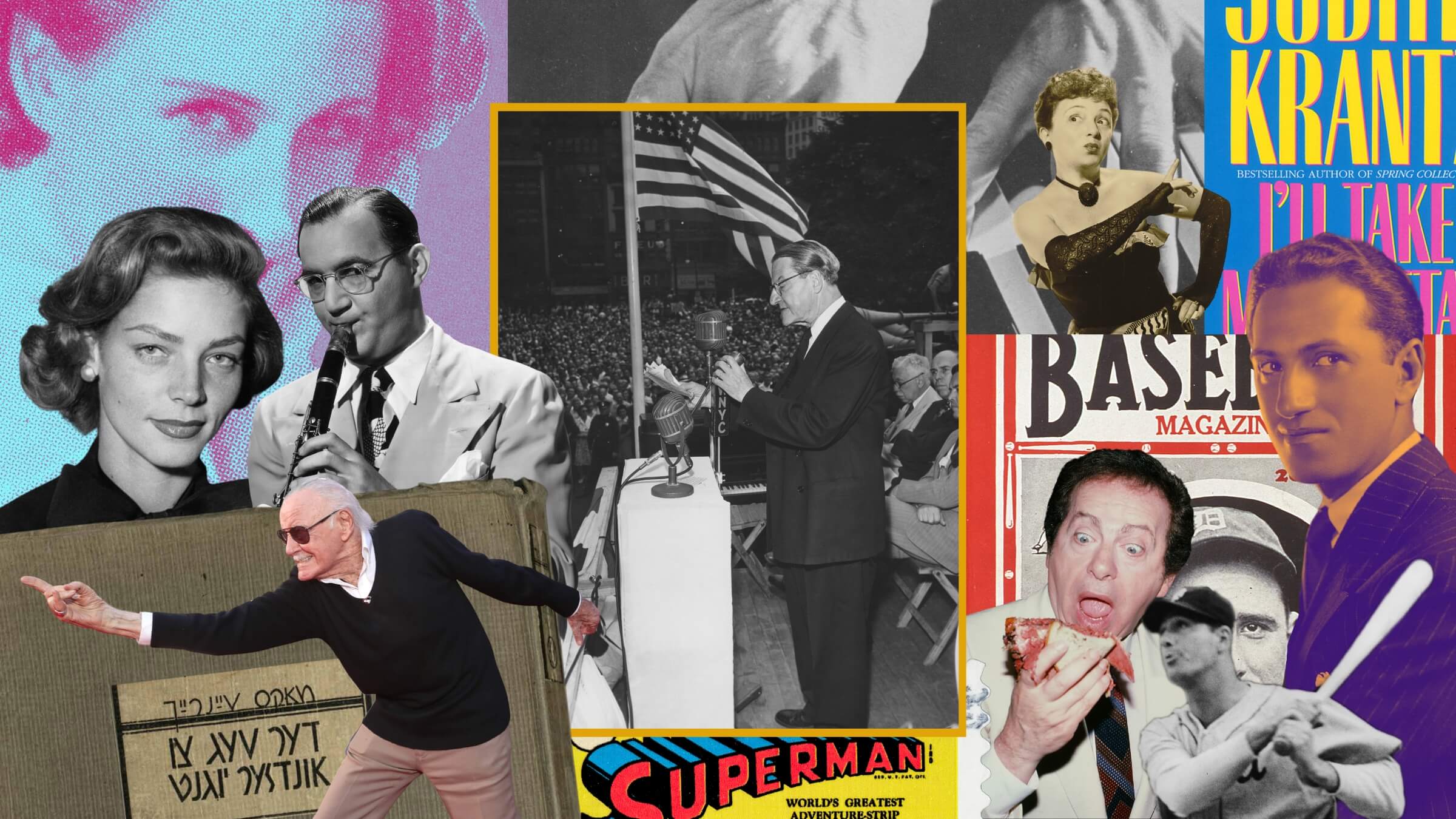
1928 Judith Krantz, whose glitzy novels about romance, sex and shopping sold more than 85 million copies, was born in New York City.
1929 The Marx Brothers released their first movie, The Cocoanuts. Universally known by their stage names — Chico, Harpo, Groucho and Zeppo — the brothers (born Leonard Joseph, Adolph, Julius Henry and Herbert Manfred) were sons of immigrants. (Another brother, Milton, aka Gummo, performed in vaudeville with the family but did not have a film career.) They were inducted into the Motion Picture Hall of Fame in 1977.
1930 Norma Shearer, a convert, became the first Jewish performer to win an Academy Award, taking home the Oscar for best actress for her role in The Divorcee.
1931 Jackie Mason, a rabbi, cantor and comedian who brought the Borscht Belt to Broadway, was born. He died in 2021.
1932 Benjamin N. Cardozo was sworn in as a Supreme Court justice, becoming the second Jew and first Sephardic justice on the high court. He came from one of the oldest Jewish families in North America; Emma Lazarus was his cousin.
1933 Rabbi Abraham Joshua Heschel received his doctorate in Berlin. He was arrested by the Nazis in 1938, moved to the U.S. in 1940, and became an influential figure in the 1960s, marching with the Rev. Martin Luther King Jr. in Selma, Alabama, and speaking out against the Vietnam War.
1934 In his second season with the Detroit Tigers, Hank Greenberg led the American League with 63 doubles. Greenberg, known as the Hebrew Hammer, became one of the greatest Jewish athletes in history, a two-time winner of Major League Baseball’s Most Valuable Player award with a career high of 58 home runs in one season (1938). He was inducted into the Baseball Hall of Fame in 1956.
1935 Bandleader Benny Goodman made history with a show at the Palomar Ballroom in Los Angeles. The show, seen live by thousands of fans and heard on the radio by millions more, is considered the start of the swing era. Goodman’s father, a poor immigrant tailor, paid 25 cents a week for his son to take clarinet lessons starting at age 10 at a Chicago synagogue.
1936 Molly Picon’s most famous film, Yidl Mitn Fidl (Yidl With His Fiddle), was released. Picon, a New York-born Yiddish theater superstar, went on to a career that included English-language radio, films, TV and Broadway.
1937 George Gershwin, one of the most celebrated composers of the 20th century, died at age 38 after surgery for a brain tumor. His most famous works include Rhapsody in Blue, Porgy and Bess, An American in Paris and the song “I Got Rhythm,” which was written with his brother, Ira.
1938 The first comic book superhero appeared in Action Comics and quickly became a cultural icon. His name was Superman, and his creators were Jerry Siegel and Joe Shuster, who met in high school in Cleveland.
1939 Felix Frankfurter, a founder of the American Civil Liberties Union, replaced the late Benjamin Cardozo on the Supreme Court. In a 1943 dissent rejecting a freedom of religion argument, Frankfurter famously called himself a member of “the most vilified and persecuted minority in history.”
1940 YIVO founder Max Weinreich emigrated to the U.S. The Yiddish research institute had been headquartered in Vilna, Lithuania; he reestablished it in New York.
1941 One of the most celebrated songwriters of the late 20th century, Paul Simon, was born in Queens. Simon’s early hits, including “Bridge Over Troubled Water,” “The Boxer,” “Mrs. Robinson” and “Homeward Bound,” were recorded with Art Garfunkel. His acclaimed solo career included albums like Graceland, There Goes Rhymin’ Simon and Still Crazy After All These Years.
1942 Rabbi Stephen S. Wise, president of the American Jewish Congress, presented evidence at a press conference that the Nazis were murdering millions of European Jews. The news made headlines nationwide; Wise followed up with a letter asking President Franklin D. Roosevelt to take action.
1943 Stan Lee, the legendary Marvel Comics writer whose creations include the Fantastic Four, Spider-Man, the Avengers and the X-Men, was credited for the first time under his own name in a comic book, Terry-Toons Comic No. 12.
1944 Lauren Bacall became a Hollywood superstar after appearing in the film To Have and Have Not with Humphrey Bogart. Bacall’s first cousin was Shimon Peres, who served as both Israel’s prime minister and president before his death in 2016.
1945-1960
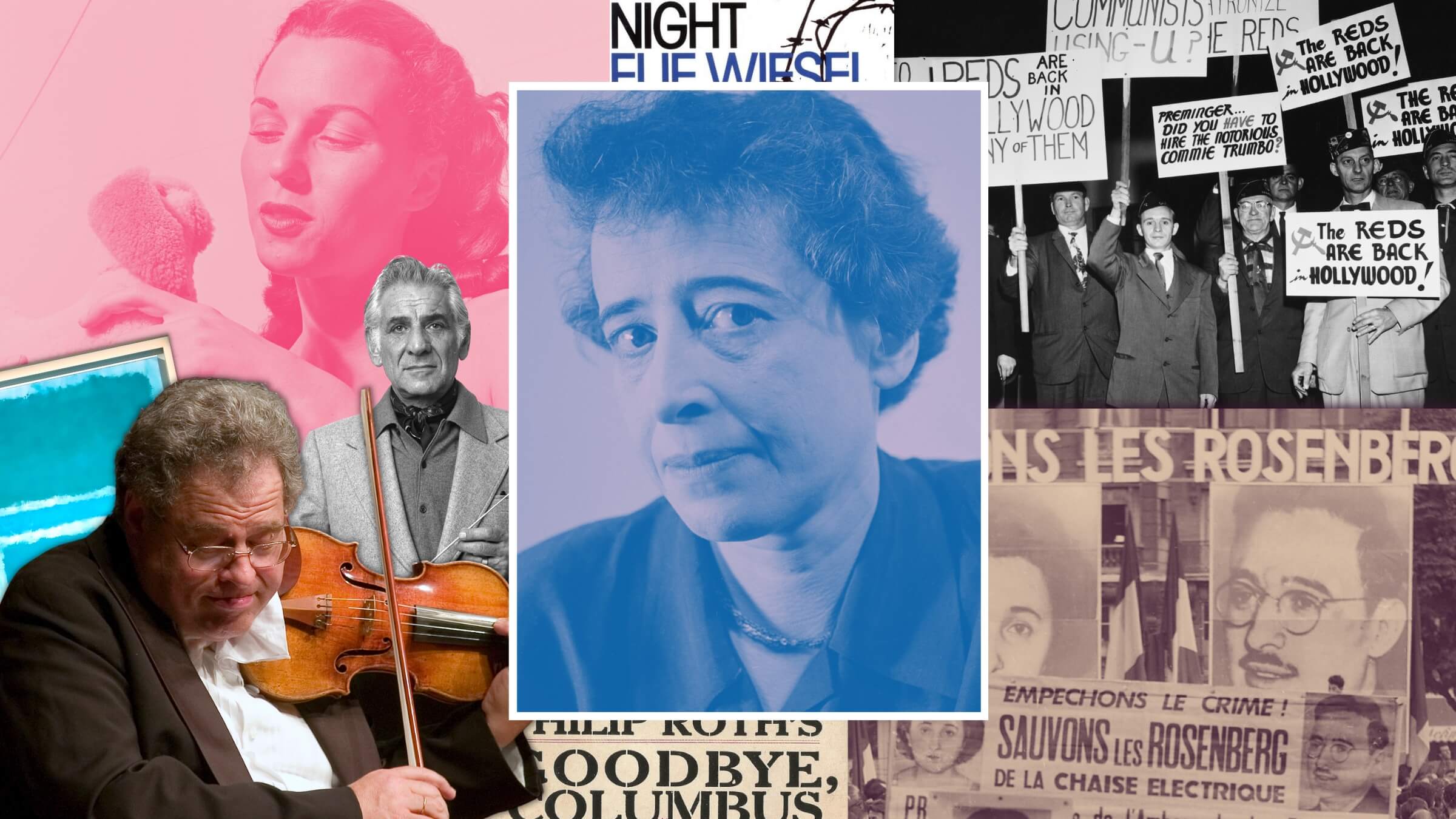
1945 Bess Myerson became the first (and only) Jew crowned Miss America. Religion News Service described her win, in the aftermath of World War II, as “the resurrection of the Jewish body — the journey from degradation to beauty.”
1946 Maurice Podoloff, a lawyer, became president of the newly formed Basketball Association of America, which eventually merged with the National Basketball League and rebranded as the NBA. Podoloff ran the enterprise until 1963.
1947 Six of the 10 Hollywood producers, screenwriters and directors cited for contempt of Congress for refusing to testify before the House Committee on Un-American Activities were Jewish. Their names — John Howard Lawson, Alvah Bessie, Herbert Biberman, Lester Cole, Albert Maltz and Samuel Ornitz — are not well known individually, but the Hollywood Ten were immediately blacklisted as communists by major studio heads — including Jewish executives Louis B. Mayer, Samuel Goldwyn and Albert Warner.
1948 Eddie Jacobson played a key role in persuading his lifelong friend, President Harry Truman, to make the United States the first country to recognize Israel.
1949 Stella Adler, whose parents were Yiddish theater powerhouses, launched the Stella Adler Acting Studio. Her students included Marlon Brando, Robert De Niro and Candice Bergen.
1950 Chuck Schumer was born in Brooklyn. As a U.S. senator from New York, Schumer became the first Jew to hold the position of Senate minority leader in 2016; five years later, when Democrats took control of the Senate, he became majority leader and the highest-ranking Jew in U.S. government history. Fun fact: Schumer was first elected to the Senate in 1998 after Republican incumbent Sen. Al D’Amato made headlines for calling him a “putzhead.”
1951 Political theorist and philosopher Hannah Arendt published The Origins of Totalitarianism. A decade later, while covering the trial of Adolph Eichmann for The New Yorker, Arendt coined the phrase “the banality of evil.”
1952 Work by abstract painter Mark Rothko was exhibited at the Museum of Modern Art in a landmark show called Fifteen Americans. MOMA acquired its first Rothko painting the same year.
1953 Julius and Ethel Rosenberg were executed by the U.S. government after being convicted of spying for the Soviet Union.
1954 Jonas Salk carried out a national study to test his polio vaccine, which was approved a year later. Within 25 years, polio was essentially wiped out in the U.S., though there was a case in a Hasidic enclave in upstate New York this summer.
1955 Ten-year-old Itzhak Perlman gave his first violin concert in Tel Aviv. He moved from Israel to the U.S. as a teenager and became one of the world’s preeminent violinists, performing at President Barack Obama’s 2009 inauguration, a 2007 White House state dinner honoring Queen Elizabeth II, and a 2022 White House Rosh Hashanah event.
1956 Playwright Tony Kushner was born. His epic play about the AIDS epidemic, Angels in America, won the Pulitzer Prize and four Tony Awards. His most autobiographical play, Caroline, or Change, about a Black maid employed by a Southern Jewish family, includes a bitingly funny Hanukkah party scene. He has frequently collaborated with Steven Spielberg, including on Spielberg’s 2022 semi-autobiographical film The Fabelmans, and the two have gone to High Holiday services together.
1957 “Howl,” a poem by Allen Ginsberg, was the subject of an important U.S. Supreme Court ruling that any work with “the slightest redeeming social importance” cannot be deemed obscene. Ginsberg was a central figure in the Beat Generation, a literary movement that challenged the conventions of 1950s American culture and paved the way for the hippies and radicals of the 1960s.
1958 Leonard Bernstein, one of the most important musicians of the 20th century, became the first American-born conductor to lead a major orchestra on his own as director of the New York Philharmonic. At the same time, he became a household name hosting the CBS TV show Young People’s Concerts, which were seen by millions worldwide. Among Bernstein’s greatest works is West Side Story, created in collaboration with Stephen Sondheim and Jerome Robbins.
1959 Goodbye Columbus, a groundbreaking collection of short stories by Philip Roth, was published. The collection, which won the National Book Award, was controversial for its sometimes harsh depiction of Jews as they assimilated into American life.
1960 Elie Wiesel’s memoir Night, about the horrors of his time in Auschwitz and Buchenwald, was published in English, four years after he moved to New York City. It became one of the seminal works about the Holocaust. Wiesel was awarded the Nobel Peace Prize in 1986.
1961-1975
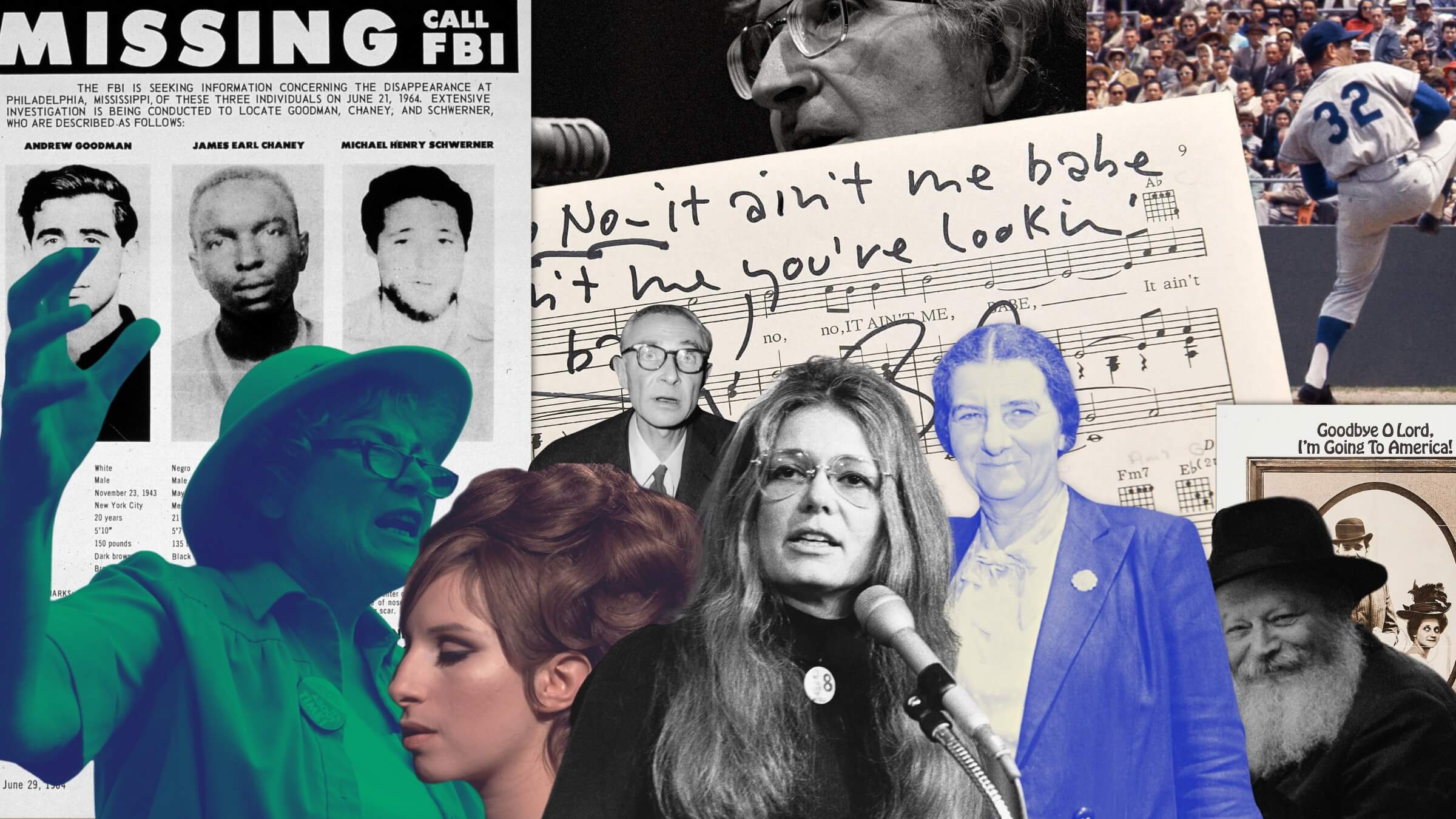
1961 A 19-year-old guitar player from Minnesota named Bob Dylan came to New York City, where he became an icon of folk, rock and protest music. Fifty-five years later, in 2016, Dylan won the Nobel Prize in literature for his complex and poetic lyrics.
1962 Comedian Lenny Bruce was convicted of obscenity for using sexually explicit language at a Chicago club. The conviction was reversed by an Illinois appeals court, but he was blacklisted by the club circuit after a subsequent arrest in New York. Bob Dylan was among the artists who spoke out on his behalf.
1963 J. Robert Oppenheimer, who ran the Manhattan Project and was considered the “father of the atomic bomb,” was presented with the Enrico Fermi Award by President Lyndon Johnson. The honor was seen as a way of redressing the shocking revocation of Oppenheimer’s national security clearance as part of a communist witch hunt in 1954. (President John F. Kennedy made the decision to recognize Oppenheimer’s contributions; Johnson presented the award just days after JFK’s assassination.)
1964 Civil rights activists Andrew Goodman and Michael Schwerner, who were Jewish, and James Chaney, who was African American, were murdered in Mississippi. The killings galvanized support for the Civil Rights Act of 1964.
1965 Los Angeles Dodger Sandy Koufax, considered the greatest Jewish athlete of all time and arguably the greatest pitcher in baseball history, refused to play in the World Series on Yom Kippur.
1966 Betty Friedan co-founded the National Organization of Women and became its first president. Her 1963 book The Feminine Mystique helped spark the second wave of feminism.
1967 Noam Chomsky published his influential anti-Vietnam essay “The Responsibility of Intellectuals.” Chomsky, who was deemed the world’s top public intellectual by a 2006 poll, is also the most important modern theorist in linguistics and a longtime critic of Israel.
1968 Brooklyn-born actress and singer Barbra Streisand, whose looks, accent and choice of material made her one of the most recognizably Jewish performers of all time, made her Oscar-winning movie debut in Funny Girl.
1969 Rebbe Menachem Mendel Schneerson, who fled Nazi-occupied Europe in 1941, announced that the Lubavitch movement would keep its headquarters in Crown Heights, Brooklyn, rather than join what he called the “plague” of Jewish neighborhoods being abandoned as white flight accelerated New York City’s decline. Schneerson, who built the Lubavitchers into a powerful force around the world, was posthumously awarded a Congressional Medal of Honor in 1994.
1970 Running on the campaign slogan, “This woman’s place is in the House — the House of Representatives,” Bella Abzug beat a seven-term incumbent to represent Manhattan in Congress. She later became the first woman to run for mayor of New York City and the first woman to run for New York’s U.S. Senate seat. (She lost both races.)
1971 Gloria Steinem, one of the most prominent feminists of all time, launched Ms. Magazine and co-founded the National Women’s Political Caucus with Bella Abzug, Shirley Chisholm, Betty Friedan and Myrlie Evers-Williams, widow of Medgar Evers.
1972 Sally Priesand became the first female rabbi ordained in the United States after graduating from the Reform movement’s Hebrew Union College. More than 1,200 women have been ordained in various Jewish movements since.
1973 Henry Kissinger became the first Jewish secretary of state and won the Nobel Peace Prize for negotiating a ceasefire in Vietnam. But his legacy is controversial: He also approved thousands of bombing raids in Cambodia and supported the 1973 military coup in Chile and Argentina’s junta.
1974 Golda Meir, who spent 15 of her formative years in Milwaukee and Denver, was named the most admired woman in the U.S. — ahead of first lady Betty Ford. Meir was Israel’s fourth prime minister and the fourth woman to serve as prime minister of any country.
1975 Joan Micklin Silver’s critically acclaimed movie Hester Street was released. With dialogue in Yiddish and English and a focus on women, the film tells the story of Jewish immigrants and their assimilation at the turn of the 20th century on the Lower East Side.
1976-1990
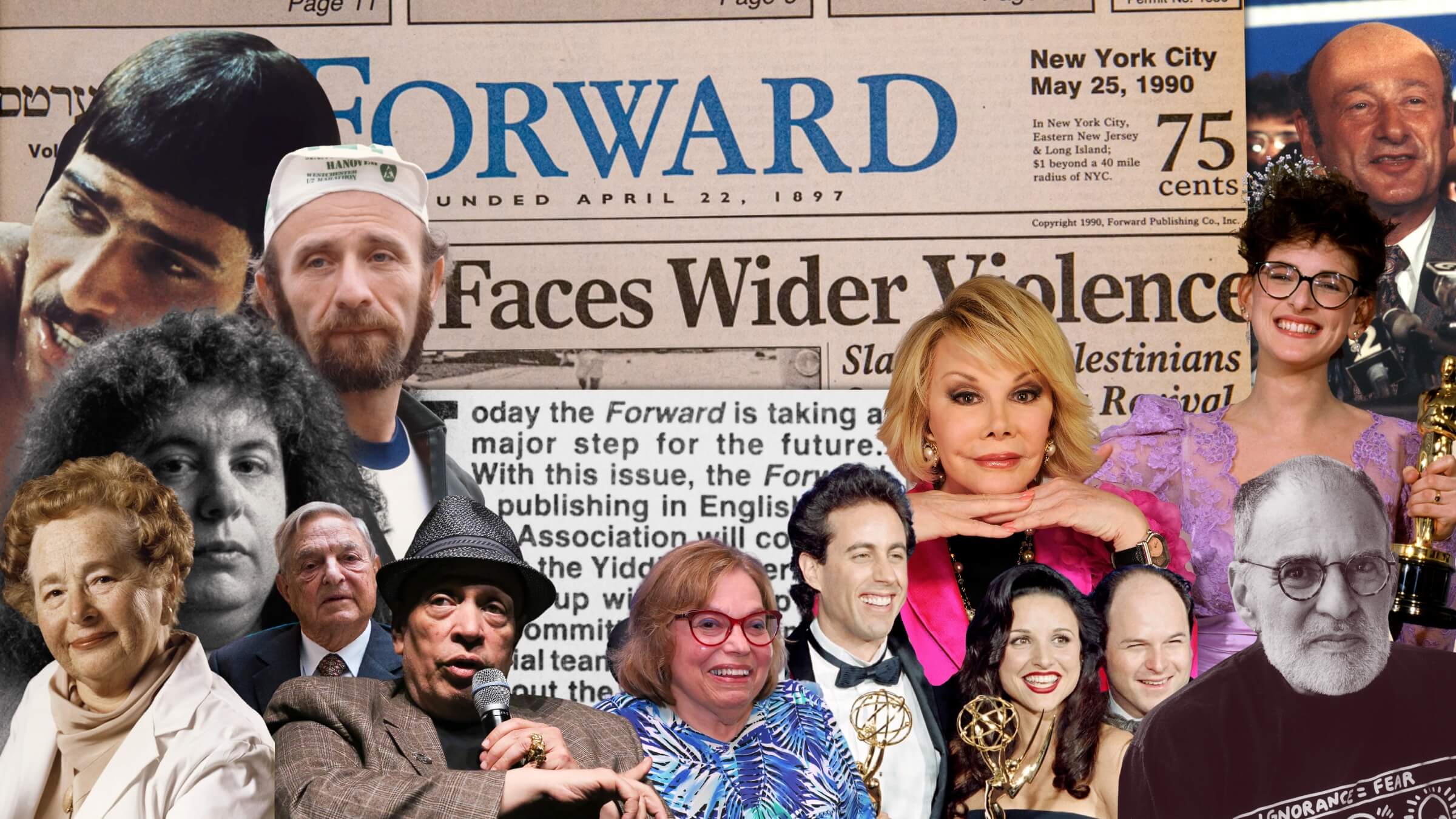
1976 Holocaust survivor Fred Lebow organized and directed the first five-borough New York City Marathon. Born Fischel Lebowitz in Romania, Lebow completed 69 marathons in 30 countries during his career. His last New York marathon was in 1992, when he was 60 and had brain cancer; he died two years later.
1977 Judith Heumann, a founder of the disability rights movement, led a 26-day sit-in at a federal building in San Francisco. The protest spurred implementation of Section 504 of the Rehabilitation Act, a precursor to the Americans with Disabilities Act.
1978 Edward I. Koch began his 12-year run as New York City’s brash and ebullient mayor. Bellowing “How’m I doing?” to constituents as he traipsed around town, Koch presided over the first wave of the city’s long-term recovery after years of decline. But his lack of leadership on race relations, the AIDS crisis and other issues have clouded his legacy.
1979 Google co-founder Sergey Brin arrived in the U.S. as a child with his family. They were among 150,000 Jews to leave the Soviet Union in the 1970s.
1980 Aaron Lansky launched the Yiddish Book Center to save thousands of Yiddish books being discarded by Jews who couldn’t read them. Today the center, located in Amherst, Massachusetts, has more than 1 million volumes and is one of the most vibrant Jewish cultural organizations in the world.
1981 Feminist Andrea Dworkin published Pornography: Men Possessing Women, arguing that pornography constitutes rape and violence against women, violates their civil rights and should not be protected by the First Amendment.
1982 Larry Kramer co-founded Gay Men’s Health Crisis in response to the AIDS epidemic but was soon ousted over his confrontational activism. He went on to help launch a more strident group, ACT UP, and wrote a critically acclaimed play, The Normal Heart, about the early AIDS years in New York City.
1983 Swimmer Mark Spitz, winner of nine Olympic gold medals, was inducted into the U.S. Olympic Hall of Fame. Regarded as one of the greatest Jewish athletes of all time, Spitz won seven golds at the 1972 Munich Olympics, a record that stood for 36 years. His Olympic triumph culminated a day before the Munich massacre, in which Palestinian terrorists murdered 11 Israelis.
1984 Holocaust survivor George Soros started a foundation in his native Hungary that led to the launch of his New York-based Open Society Foundations network for progressive causes around the world. Soros’ name has become a trope for antisemitic conspiracy theories.
1985 Marlee Matlin played a supporting role in a Chicago stage production of Children of a Lesser God, and was then cast for the lead role in the film. She went on to become the youngest person to ever win the Academy Award for best actress, as well as the first deaf performer to win an Oscar.
1986 No-holds-barred comedian Joan Rivers became the first woman to host a late-night network television talk show.
1987 Walter Mosley enrolled in a writing program at City College in New York, where his professor, Irish writer Edna O’Brien, told him: “Walter, you’re Black, Jewish, with a poor upbringing. There are riches therein.” Easy Rawlins, the protagonist of Mosley’s first book, Devil in a Blue Dress, broke ground in the mystery genre as a Black detective in a racist world. Mosley went on to publish more than 60 books, and in 2020 was the first Black man honored with the National Book Foundation’s Medal for Distinguished Contribution to American Letters.
1988 Gertrude Belle Elion won the Nobel Prize in medicine, sharing the award with two other scientists for innovations in developing new drugs. Despite lacking a doctorate, she developed some of the most important drugs of the 20th century, along with new research techniques for studying abnormal cells and pathogens.
1989 Jerry Seinfeld’s eponymous sitcom began a nine-season run on TV, making him one of the most popular comedians of his time. Bits from the show — like the fake holiday of Festivus and the phrases ”Yada, yada,” “Serenity now!” and “Not that there’s anything wrong with that” — remain cultural touchstones long after the show left the air.
1990 Seth Lipsky launched a new, English-language version of the Forward, which published separately alongside the Yiddish paper.
1991-2007
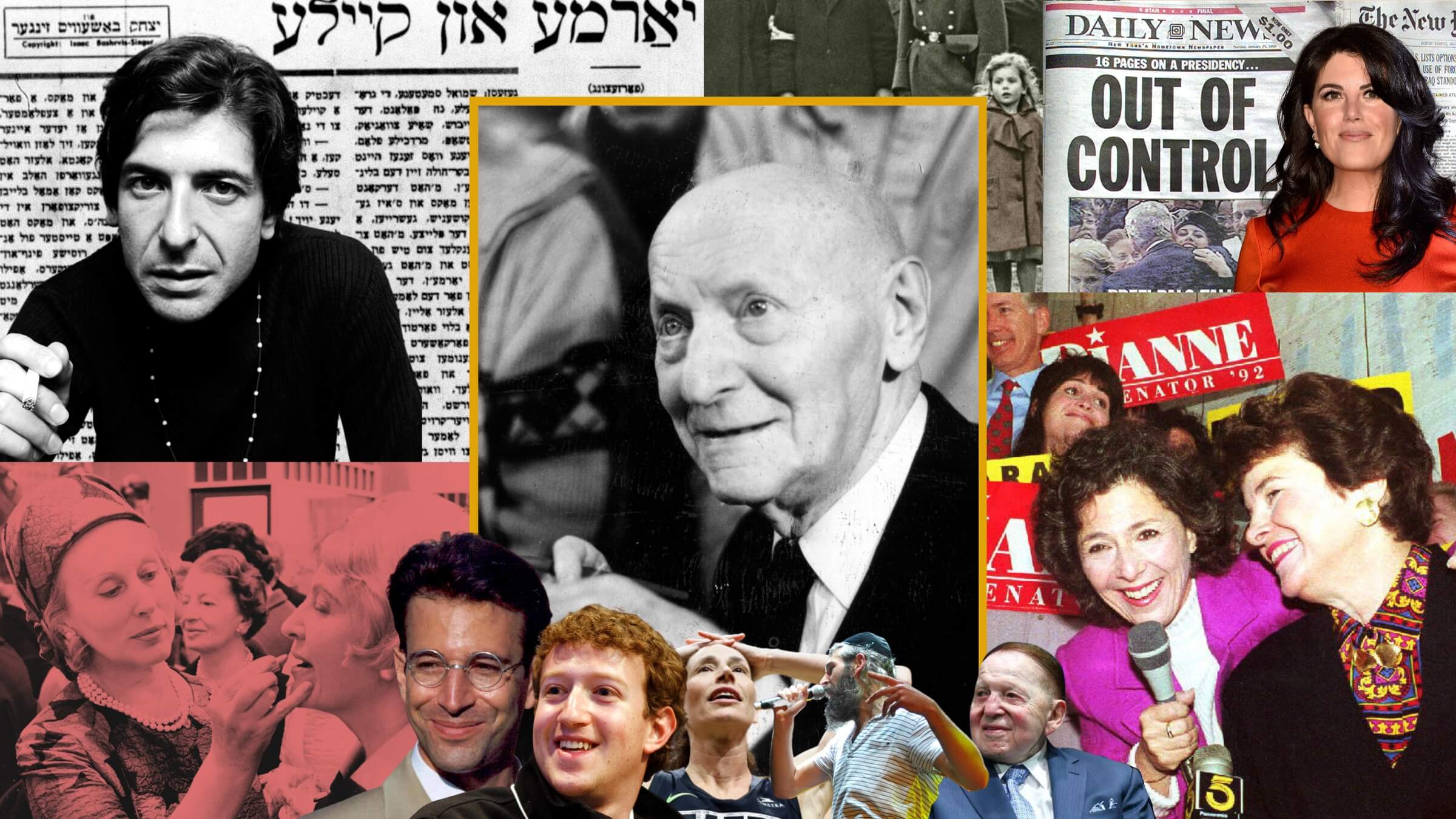
1991 Nobel Prize winner Isaac Bashevis Singer, whose work often appeared in the Forward, died. His novel Enemies: A Love Story, which was serialized in our pages, was made into a film in 1989. Yentl, the 1983 film starring Barbra Streisand as a girl who disguises herself as a boy in order to study at a yeshiva, was based on a Singer short story.
1992 Dianne Feinstein and Barbara Boxer became the first Jewish women elected to the U.S. Senate. Their victories also marked the first time Californians elected a female senator, and the first time any state was represented by two women in the U.S. Senate.
1993 Steven Spielberg released his critically acclaimed epic film Schindler’s List, based on the true story of a German industrialist who saved Jews during the Holocaust. The movie won seven Oscars and led Spielberg to launch the Shoah Foundation at the University of Southern California, which filmed interviews with 52,000 survivors of the Holocaust and genocides in Nanjing and Rwanda.
1994 Joan Nathan won a James Beard Award and the International Association of Culinary Professionals/Julia Child Cookbook of the Year Award for her classic cookbook, Jewish Cooking in America.
1995 The eponymous cosmetics company founded by Estée Lauder, one of the most successful entrepreneurs in the U.S., went public on the New York Stock Exchange. Today, the company ranks No. 228 on the Fortune 500 list of largest U.S. companies. Lauder’s billionaire son Ronald later became head of the World Jewish Congress, an important philanthropist to Jewish and Israeli causes, and a major financial backer of Republican politicians.
1996 Federal Reserve Chair Alan Greenspan used the term “irrational exuberance” to suggest that the stock market was overvalued. During his 19-year tenure, Greenspan was not only influential in the realms of finance and government but also achieved celebrity status in the media and the public eye.
1997 Days after being sworn in as the first female U.S. secretary of state, Madeleine Albright learned from a Washington Post investigation that her parents had hid their Jewish heritage while raising her Catholic. Three of Albright’s grandparents were murdered in the Holocaust.
1998 President Bill Clinton’s relationship with Monica Lewinsky led to his impeachment, and arguably changed the course of U.S. politics by tarnishing both Al Gore’s and Hillary Clinton’s prospects for the presidency. Lewinsky, who has been compared to Queen Esther, became an activist on bullying and other issues.
1999 Demographer Gary Tobin and his wife, Diane, published a “Study of Ethnic and Racial Diversity of the Jewish Population of the United States,” finding that 20% of American Jews are of African American, Latino, Asian, Sephardic or Mizrahi heritage. The Tobins, white Jews who adopted a Black son, went on to launch a San Francisco-based organization, Be’chol Lashon, that promotes inclusion of Jews of color in the Jewish community.
2000 Basketball player Sue Bird, who grew up on Long Island, won the first of her two NCAA championships while a sophomore at the University of Connecticut. She went on to become a legendary four-time WNBA champ and five-time Olympic gold medalist. Upon her retirement in 2022, she held the WNBA records for career assists and games played.
2001 David Weiss and Alan Feinberg, members of the Ner Tamid fraternal organization for Jewish firefighters, were among 3,000 people killed in the Sept. 11 terror attacks. Other Jews among the 300 firefighters who died when the Twin Towers fell include Stephen Belson and Scott Davidson. Davidson’s Jewish identity was only unearthed years later, by his son, actor Pete Davidson.
2002 The Wall Street Journal’s South Asia bureau chief, Daniel Pearl, was kidnapped and decapitated by Islamist extremists in Pakistan. A video released by the terrorists showed these among his last words: “My father’s Jewish, my mother’s Jewish, I’m Jewish. My family follows Judaism.”
2003 Calvin Klein, whose designer jeans and infamous ad starring Brooke Shields revolutionized the fashion industry, sold his company to Phillips-Van Heusen (now PVH) for $430 million. Klein was the first designer to win three consecutive Coty Awards for womenswear.
2004 Harvard student Mark Zuckerberg launched “the Facebook,” and within four years became the world’s youngest self-made billionaire.
2005 Singer Leonard Cohen, a Montreal native who moved to New York City in the 1960s and lived for years in Los Angeles, sued his manager in an LA court for stealing most of his money. He won, but with little chance of restitution, embarked on a yearslong tour to recoup his losses. The tour brought him renewed fame and acclaim.
2006 Billboard named a white Jewish singer, Matisyahu, as its top reggae artist. Although raised Reconstructionist, Matisyahu followed Chabad for a number of years and his lyrics routinely incorporate biblical and Jewish references.
2007 Billionaire Sheldon Adelson donated $25 million to Birthright Israel, funding a dramatic expansion of the program that pays for young people with Jewish heritage to visit Israel. Adelson, who was also a megadonor to Republicans, including President Donald Trump, contributed nearly $500 million to Birthright before his death in 2021.
2008-2022
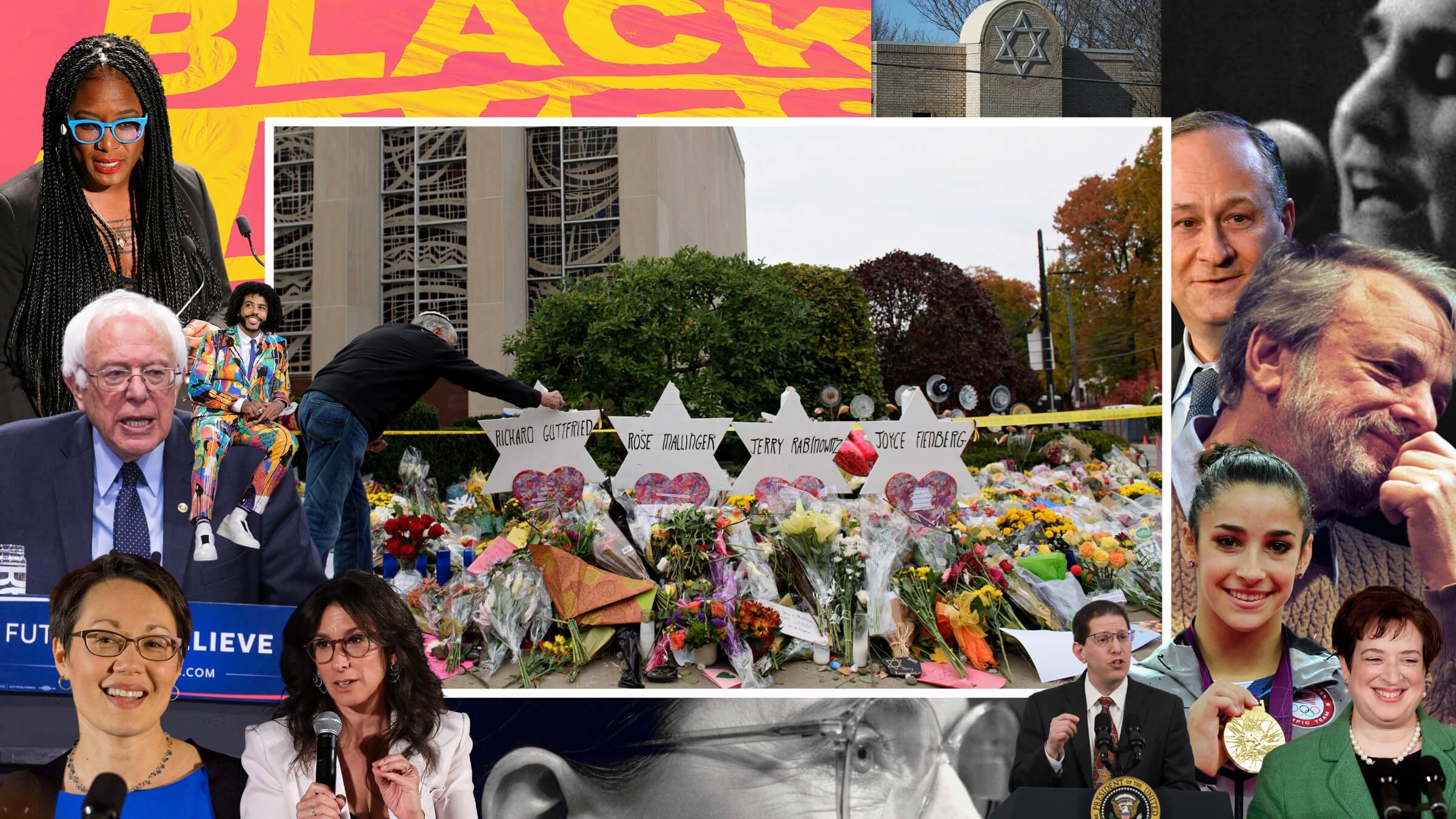
2008 Stephen Sondheim, one of Broadway’s most beloved composers and lyricists, with musicals like West Side Story, Gypsy and Company to his name, won a Tony Award for lifetime achievement.
2009 Alysa Stanton became the first Black woman ordained as a rabbi. A convert who was raised in the Church of God in Christ, Stanton, who is Reform, has said she was “born Jewish — just not to a Jewish womb.”
2010 Supreme Court Justice Elena Kagan had what may be the most Jewish moment of all time in a Senate confirmation hearing. When Sen. Lindsey Graham asked what she had been doing on Christmas, she answered: “Like all Jews, I was probably at a Chinese restaurant.”
2011 Debbie Friedman, the feminist singer-songwriter whose folksy renditions of Jewish prayers like “Mi Shebeirach” are widely used in U.S. synagogues, died of pneumonia at age 59. The Hebrew Union College renamed its school of sacred music in her honor. Friedman also wrote “Miriam’s Song,” which helped popularize the inclusion of Miriam’s story in Passover Seders.
2012 Aly Raisman became the first American woman in Olympic history to win a gold medal in the gymnastics floor exercise — and she did it to the tune of “Hava Nagila.” Raisman later helped lead the campaign to convict Larry Nassar, the USA Gymnastics team doctor who sexually abused her and others. She made headlines with a courtroom confrontation in which she declared: “I am here to face you, Larry, so you can see I’ve regained my strength, that I am no longer a victim, I am a survivor.”
2013 Following George Zimmerman’s acquittal in the Trayvon Martin shooting, Alicia Garza posted on Facebook: “I continue to be surprised at how little Black lives matter.” The post is credited with sparking the Black Lives Matter slogan and movement, which Garza co-founded.
2014 Angela Buchdahl, the first Asian American to be ordained as a cantor and then the first in North America to become a rabbi, was named senior rabbi at Manhattan’s Central Synagogue, one of the largest and most influential Reform synagogues in the country.
2015 Hamilton began its juggernaut pop-culture rise with heartthrob actor Daveed Diggs, son of a white Jewish mother and African American Christian father, originating the dual roles of Lafayette and Jefferson. Along with others in the diverse cast, Diggs’ star turn exemplified the practice of alternative casting.
2016 U.S. Sen. Bernie Sanders made his first run for the Democratic nomination for president. In his second campaign, four years later, Sanders came closer to capturing a major party nomination than any Jewish candidate in U.S. history. (Barry Goldwater, the Republican presidential nominee in 1964, was of Jewish descent but did not consider himself Jewish.)
2017 The #MeToo movement took off after New York Times reporters Jodi Kantor and Megan Twohey broke the story of Harvey Weinstein’s decades of sexual abuse. Kantor, the granddaughter of concentration camp survivors, obtained the first documented evidence of Weinstein’s misdeeds from the Hollywood mogul’s accountant, whose parents also survived the Holocaust.
2018 Eleven Jews were murdered at Pittsburgh’s Tree of Life synagogue during Shabbat services, the deadliest antisemitic attack in U.S. history: Joyce Fienberg, 75; Richard Gottfried, 65; Rose Mallinger, 97; Jerry Rabinowitz, 66; Cecil Rosenthal, 59, and his brother David Rosenthal, 54; Bernice Simon, 84, and her husband, Sylvan Simon, 86; Daniel Stein, 71; Melvin Wax, 88; and Irving Younger, 69.
2019 In Colorado, Jared Polis, who has said he “lost family in the Holocaust,” became the first openly gay governor in the U.S. Polis married his longtime partner, Marlon Reis, in a Jewish ceremony complete with chuppah and glass-breaking at the University of Colorado in 2021.
2020 Ruth Bader Ginsburg died and was the first woman, the first Jew and only the second Supreme Court justice to lie in state at the Capitol. A feminist legal pioneer turned pop-culture icon and the second woman on the Supreme Court, Ginsburg’s legacy includes groundbreaking work on civil rights and dissents on many issues as the court shifted to the right.
2021 Kamala Harris’ husband, Douglas Emhoff, became second gentleman of the United States, and the first man and first Jew to be married to a vice president. Emhoff installed a mezuzah at the vice president’s official residence at the Naval Observatory, hosted a virtual Passover Seder on behalf of the White House that reached 34,000 people, and chaired a White House roundtable on antisemitism.
2022 Rabbi Charlie Cytron-Walker saved himself and several congregants by throwing a chair at a British gunman who had held them hostage in their Reform synagogue in Colleyville, Texas, for 11 hours. Cytron-Walker had welcomed the wandering stranger with tea before Shabbat services, then silently recited the Shema and Hashkiveinu prayers during the ordeal, while calling on security training he had undergone in preparation for just such a situation.
“We listened to him, we answered his questions, we shared a little about ourselves,” the rabbi recalled in an interview, “and every moment was terrifying.”
Laura E. Adkins, Nora Berman, Samuel Breslow, Benyamin Cohen, Irene Katz Connelly, Rob Eshman, Zach Golden, PJ Grisar, Lauren Hakimi, Louis Keene, Adam Langer, Matthew Litman, Rudy Malcom, Lauren Markoe, Jenn Martin, Chana Pollack, Arno Rosenfeld, Rukhl Schaechter, Eliya Smith, Robin Washington and Jake Wasserman contributed to this report.
About the images
Our editorial fellow Matthew Litman created the collages in this article using the design tool Canva to combine photographs and artifacts, most of which were taken from historical archives, including the Forward’s.
Matt, an accomplished photographer himself, was aiming for a pop-art feel that would be both interesting to look at and efficient, displaying the most information in the most condensed way. He avoided posed photos of people smiling at the camera, and also skipped some of the most famous — and therefore perhaps most familiar — faces, like Paul Simon and the Marx Brothers. And he had a little fun with juxtaposition and layering: Debbie Friedman and Bob Dylan are paired in case they want to try a duet; maybe Matisyahu will ask for financial backing from Sheldon Adelson.
Altogether, Matt’s collages include more than 70 of the people on our 125 list. We feared that cramming more in would have made them harder to understand or enjoy. In some cases, we were also limited by copyright issues and the resources we had at our disposal.
We selected most of the photos from Getty Images, to which we subscribe. Among them are a handful of portraits by the luminous Fred Stein.
But even Getty has its blind spots. We found plenty of options for Fanny Brice, Molly Picon and Bess Myerson, but none for Sigmund Livingston, the founder of the Anti-Defamation League, or Supreme Court Justice Benjamin N. Cardozo. There was just a single blurry photo of Rabbi Abraham Joshua Heschel in the Getty archives, and Alysa Stanton, the first Black woman to be ordained as a rabbi, was nowhere to be found. Neither was Andrea Dworkin.
Who’s Who?
How many of the faces can you recognize? Test yourself using the numbered version (created by Shayna Rudoren) and key below. Send feedback — including complaints about who we left off — to [email protected], subject line: Forward 125.
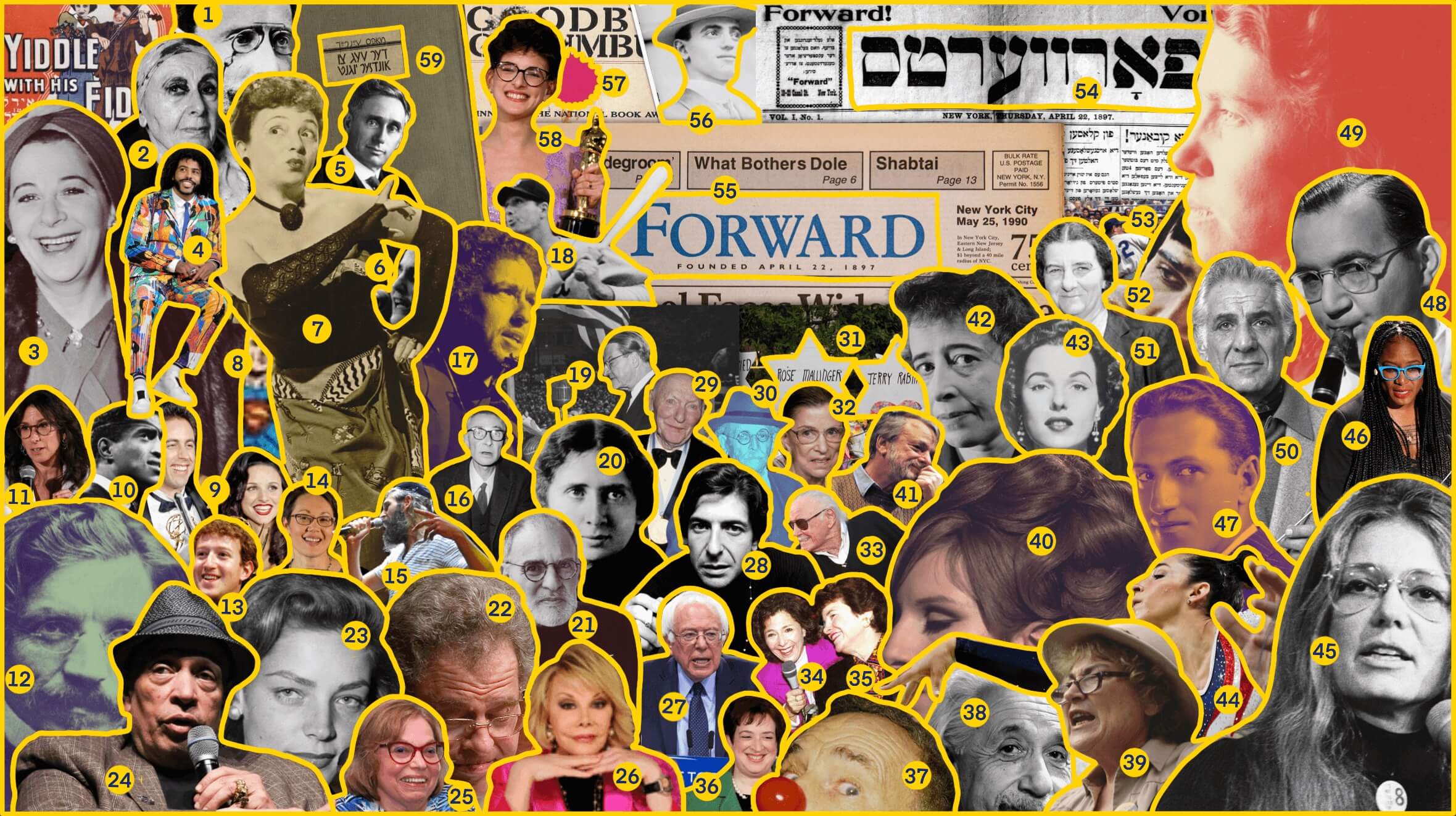
- Joseph Pulitzer (1898)
- Louise Nevelson (1899)
- Fanny Brice (1910)
- Daveed Diggs (2015)
- Louis Brandeis (1916)
- Debbie Friedman (2011)
- Molly Picon (1936)
- Jerry Siegel and Joe Shuster (1938)
- Jerry Seinfeld (1989)
- Sammy Davis Jr. (1925)
- Jodi Kantor (2017)
- Sholem Aleichem (1914)
- Mark Zuckerberg (2004)
- Angela Buchdahl (2014)
- Matisyahu (2006)
- Robert Oppenheimer (1963)
- Bob Dylan (1961)
- Hank Greenberg (1934)
- Rabbi Stephen S. Wise (1942)
- Rose Schneiderman (1911)
- Larry Kramer (1982)
- Itzhak Perlman (1955)
- Lauren Bacall (1944)
- Walter Mosley (1987)
- Judith Heumann (1977)
- Joan Rivers (1986)
- Bernie Sanders (2016)
- Leonard Cohen (2005)
- Isaac Bashevis Singer (1991)
- Ab Cahan (1897)
- Memorial for the victims of Pittsburgh’s Tree of Life massacre (2018)
- Ruth Bader Ginsburg (2020)
- Stan Lee (1943)
- Barbara Boxer (1992)
- Dianne Feinstein (1992)
- Elena Kagan (2010)
- Mel Brooks (1926)
- Albert Einstein (1921)
- Bella Abzug (1970)
- Barbra Streisand (1968)
- Stephen Sondheim (2008)
- Hannah Arendt (1951)
- Bess Myerson (1945)
- Aly Raisman (2012)
- Gloria Steinem (1971)
- Alicia Garza (2013)
- George Gershwin (1937)
- Benny Goodman (1935)
- Emma Goldman (1919)
- Leonard Bernstein (1958)
- Golda Meir (1974)
- Mark Spitz (1983)
- Sandy Koufax (1965)
- First front page of the Forward (1897)
- First front page of Seth Lipsky’s English-language version of the Forward (1990)
- Leo Frank (1915)
- Philip Roth’s Goodbye Columbus (1959)
- Marlee Matlin (1985)
- Max Weinreich’s Way to Our Youth (1940)
Photo credits: Getty Images, the Forward, Library of Congress, Wikimedia, IMDB, iStock, Kali Flims, Universal Pictures, Random House, YIVO, the Center for Jewish History.
___
Updated the entry on the Marx Brothers to show that Milton “Gummo” Marx did not have a film career.

















